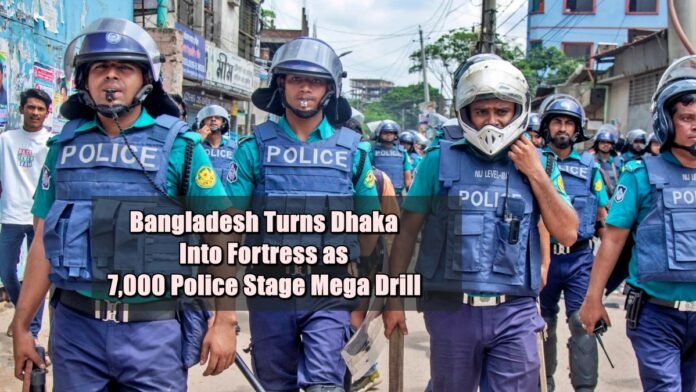
Key Points
- 7,000 police personnel conducted coordinated security drill at 142 strategic locations across Dhaka
- Exercise targets potential unrest from banned Awami League’s planned “Dhaka Lockdown” on November 13
- Yunus residence, Bangladesh Secretariat, High Court among high-security zones covered
- Army withdrew 30,000 troops from policing duties days before drill, citing rest and training needs
- International Crimes Tribunal set to announce judgment date against Sheikh Hasina in absentia trial
Dhaka: The Dhaka Metropolitan Police (DMP) conducted its largest coordinated security exercise of the year on Saturday, running from 4 PM to 5 PM across the sprawling metropolis. Approximately 7,000 police personnel from various DMP units participated in the synchronized drill, demonstrating the government’s determination to maintain control amid mounting political tensions.
The exercise covered 142 strategic locations spanning all eight DMP divisions, including the most sensitive installations in the country. High-security zones encompassed the interim government chief’s residence at Jamuna, the Bangladesh Secretariat, the High Court premises, Bangabhaban (the presidential palace), and the Chief Adviser’s Office in Tejgaon.
According to distribution across divisions, 34 locations were covered in Ramna, 17 in Motijheel, 14 each in Mirpur and Gulshan, 16 each in Tejgaon and Uttara, 15 in Lalbagh, and 16 in Wari, ensuring comprehensive coverage of the capital’s critical infrastructure.
Government Frames Drill as Routine, Officials Reveal Real Purpose
While DMP Deputy Commissioner (Media and Public Relations) Muhammad Talebur Rahman officially characterized the deployment as part of regular operational activities, describing it as “quick-response drills to ensure readiness for any kind of emergency,” police sources speaking on condition of anonymity revealed the exercise’s true objective.
An unnamed DMP official confirmed that Saturday’s mega drill was strategically designed not only to test coordination and readiness among police ranks but also to serve as a powerful deterrent against potential violence or unrest ahead of November 13. The official described it as an “exhibition-type” exercise demonstrating the force’s capacity to control crucial intersections and key city points rapidly.
Awami League’s Defiant “Dhaka Lockdown” Call
Despite being banned by the interim government and stripped of its party registration, the Awami League has called for a “Dhaka Lockdown” programme on November 13. The dissolved party, which ruled Bangladesh from 2009 to 2024 under Sheikh Hasina’s leadership, continues to command significant grassroots support among millions of voters.
The planned protest represents the most direct challenge yet to the Yunus administration’s authority, as Awami League supporters seek to demonstrate their political strength despite government restrictions on meetings, publications, and online speech supporting the party.
Recent Security Incidents Heighten Tensions
The security drill follows several alarming incidents that have rattled the capital in recent days. A cocktail bomb explosion occurred near Kakrail Church on Friday night, raising fears of coordinated violence. Additionally, banned Awami League activists conducted a torch procession in Dhanmondi’s Sankar area, where multiple explosions were reported, demonstrating the party’s continued organizational capacity despite government crackdowns.
These incidents have intensified concerns among Dhaka residents about the law and order situation, with eyewitnesses reporting significantly increased police presence across the city. Officers in full anti-riot gear, including steel helmets and body armor, were stationed at major intersections, conducting bag checks of pedestrians, questioning individuals, and inspecting suspicious vehicles.
Army Withdraws Troops Amid Transition
The police drill came just three days after the Bangladesh Army withdrew 30,000 troops, half of the approximately 60,000 soldiers deployed on policing duties over the past 15 months since Hasina’s ouster in August 2024. The army stated that withdrawn troops required rest and training after extended deployment.
However, military leadership promised full support for the parliamentary elections scheduled for February 2026, committing to redeploy additional forces when needed. The timing of the withdrawal, immediately preceding the November 13 showdown, places primary responsibility for maintaining order squarely on civilian police forces.
International Crimes Tribunal Adds Pressure
Adding to the volatile atmosphere, Bangladesh’s International Crimes Tribunal (ICT-BD) is soon expected to announce the date for delivering its judgment against Sheikh Hasina following her trial in absentia on charges of alleged crimes against humanity related to the violent crackdown on protests that led to her government’s collapse.
The tribunal’s impending announcement serves as another flashpoint in the deeply polarized political environment, with Hasina’s supporters viewing the proceedings as politically motivated while the interim government frames them as necessary accountability for past atrocities.
Sheikh Hasina Maintains Political Pressure from Exile
Despite living in self-exile in India for the past 15 months, Sheikh Hasina continues to exert substantial influence on Bangladesh’s political landscape. In recent exclusive interviews, she has accused the Yunus administration of sponsoring extremists, claimed her departure was necessary for safety, and insisted the Awami League will fight for its right to participate in upcoming elections despite the ban.
Her continued vocal presence and the organizational capacity demonstrated by her supporters have clearly unnerved the interim government, prompting the massive security response ahead of November 13. The former Prime Minister’s ability to mobilize followers from abroad underscores the depth of Bangladesh’s political crisis and the challenges facing the Yunus administration as it attempts to navigate toward elections while suppressing the country’s largest political party.






















































